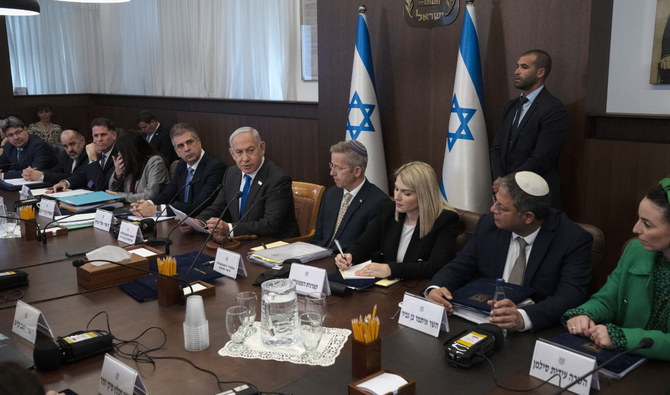CHICAGO: Israeli journalists, former diplomats and government ministers agreed on Thursday that escalating violence directed toward Palestinians under the rule of the new coalition government led by Prime Minister Benjamin Netanyahu is undermining Israel’s relations with neighboring Arab countries, in particular those that have signed the Abraham Accords or might have considered doing so.
During a discussion hosted by the Middle East Institute, the panelists said the first three months of the far-right government have been “chaotic” and its policies are “racist” and “disconnected from reality.”
Since it came to power in December, the ruling coalition has overseen the violent suppression of Palestinian protests. Nearly 100 Palestinians have been killed as Israeli and settler raids targeting activists have been stepped up throughout the occupied West Bank.
One of the most violent incidents was an assault on the Palestinian village of Huwara on Feb. 27, which an Israeli panelist described as a “pogrom,” a word used to describe an organized massacre of a particular ethnic group. Armed settlers, who claimed to be avenging an attack on Israelis by Palestinians the day before, led a violent, late-night rampage through the village in the northern West Bank, killing one Palestinian and injuring more than 100. The Israeli military, which has responded rapidly to increased tensions related to Palestinian assaults, did nothing to intervene.
“The fact is that this government, in its first three months, is totally dysfunctional and chaotic, and almost any step it takes does not come out of initiative but out of reaction to events,” said Barak Ravid, a veteran Middle East and diplomatic correspondent for Israeli media outlets.
“This is also a government that … is the most far-right government in Israel’s history, with racist and Jewish-supremacist elements in it, in key positions that have a lot of influence over foreign relations and national security, like Itamir Ben Gvir, the minister of national security, or Mr. (Bezalel) Smotrich, the minister of finance.”
Ravid continued: “When Netanyahu came in, he said several things. Firstly, he said he is going have his hands on the wheel when it comes to national security and foreign policy. I think in the three months since this government was formed it is obvious to everybody that this is not the case. He is not running anything, everything is chaotic.
“And secondly, he put forward a pretty ambitious foreign policy agenda, first stressing he will focus on Iran and on countering its nuclear program. And second, he said he will try to broaden the Abraham Accords and get a peace treaty with Saudi Arabia. In the last three months, he has done nothing, not on the first foreign policy goal and not on the second foreign policy goal.”
Ravid said the unrelated issue of the government’s proposed reforms of Israel’s judicial system, which have sparked widespread protests across Israel and international concern, has contributed the problems because it has “hijacked the government’s agenda.”
The violence in the West Bank, the panelists agreed, has caused a spike in killings of Palestinians and Israelis, and put the brakes on any more potential normalization agreements, similar to the Abraham Accords deals with Morocco, Bahrain and the UAE, in particular dashing hopes that there might be one with Saudi Arabia.
Netanyahu’s coalition “knows very well that they are harming relations with the Arab World but they don’t care,” said Nachman Shai, Israel’s former minister of diaspora affairs.
“Don’t tell me they don’t know, when they let Minister Ben Gvir on the Temple Mount (Al-Aqsa Mosque) or other statements were made by coalition members and government ministers. They know very well that they are harming relations with the Arab world but they don’t care.”
Shai described the “Huwara pogrom” as a “terrible event, a tragedy that disrupted our relationship with the United States, with the Jewish community, and with the world. And especially with our relations with the Arab World.”
He said the new government’s policies have drawn anger from the administration of US President Joe Biden, who has been a strong advocate for Israeli security and democracy.
Elie Podeh, a professor of Middle Eastern Studies at the Hebrew University in Jerusalem, said the biggest effect of the coalition’s actions has been to undermine any possibility of normalized relations between Saudi Arabia and Israel, which was “Netanyahu’s main target” for his foreign policy.
“Any tension, and certainly an intifada and anything significant that happens between Israel and the Palestinians, especially if Jerusalem is involved, is going to hamper and is going to hurt any developments between the Israelis and the Saudis,” Podeh said. “So, it is not on the horizon, at least the immediate horizon.”
Maya Sion Tzidkiyahu, director of Mitvim, the Israel-Europe Relations Program at the Israeli Institute for Regional Foreign Policies, said the turmoil during the first 100 days of Netanyahu’s government has not only soured support for Israel among leaders of EU countries, but also the normalized relations with the UAE. She said the Netanyahu government has not recognized the damage it is causing to its efforts to improve relations with the Arab World.
The moderator of the discussion was Nimrod Goren, a senior fellow of Israeli Affairs at the Middle East Institute.



























